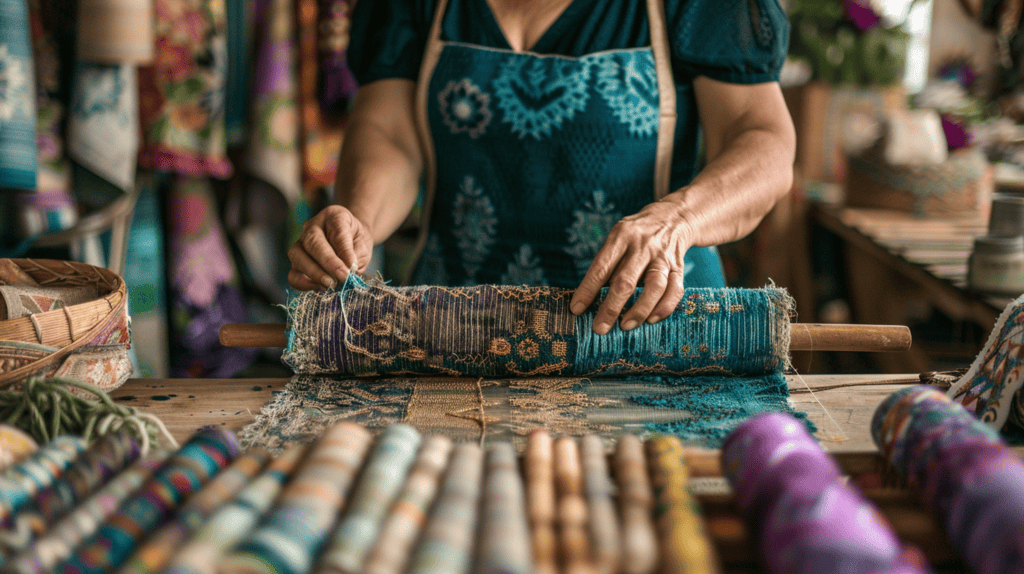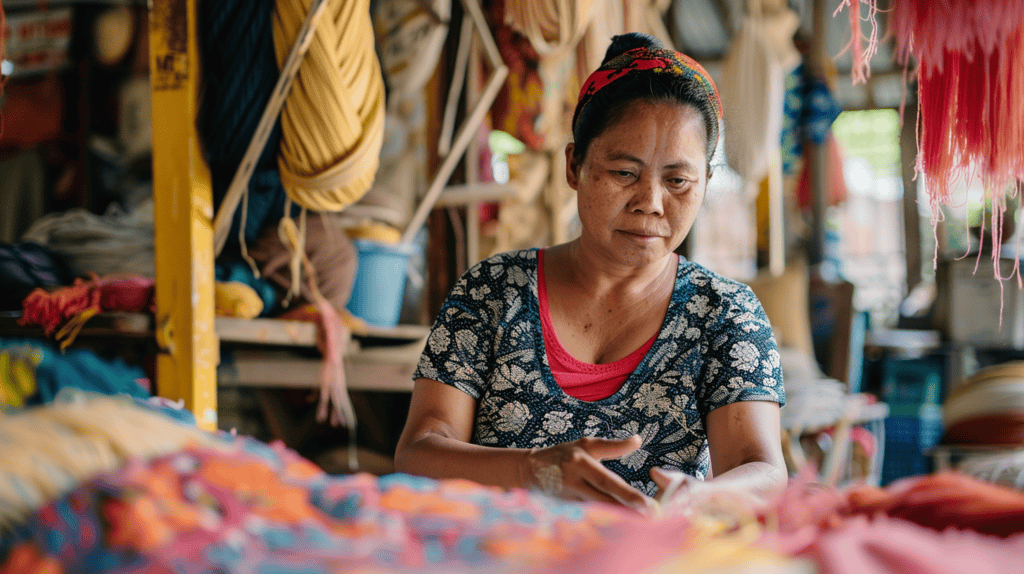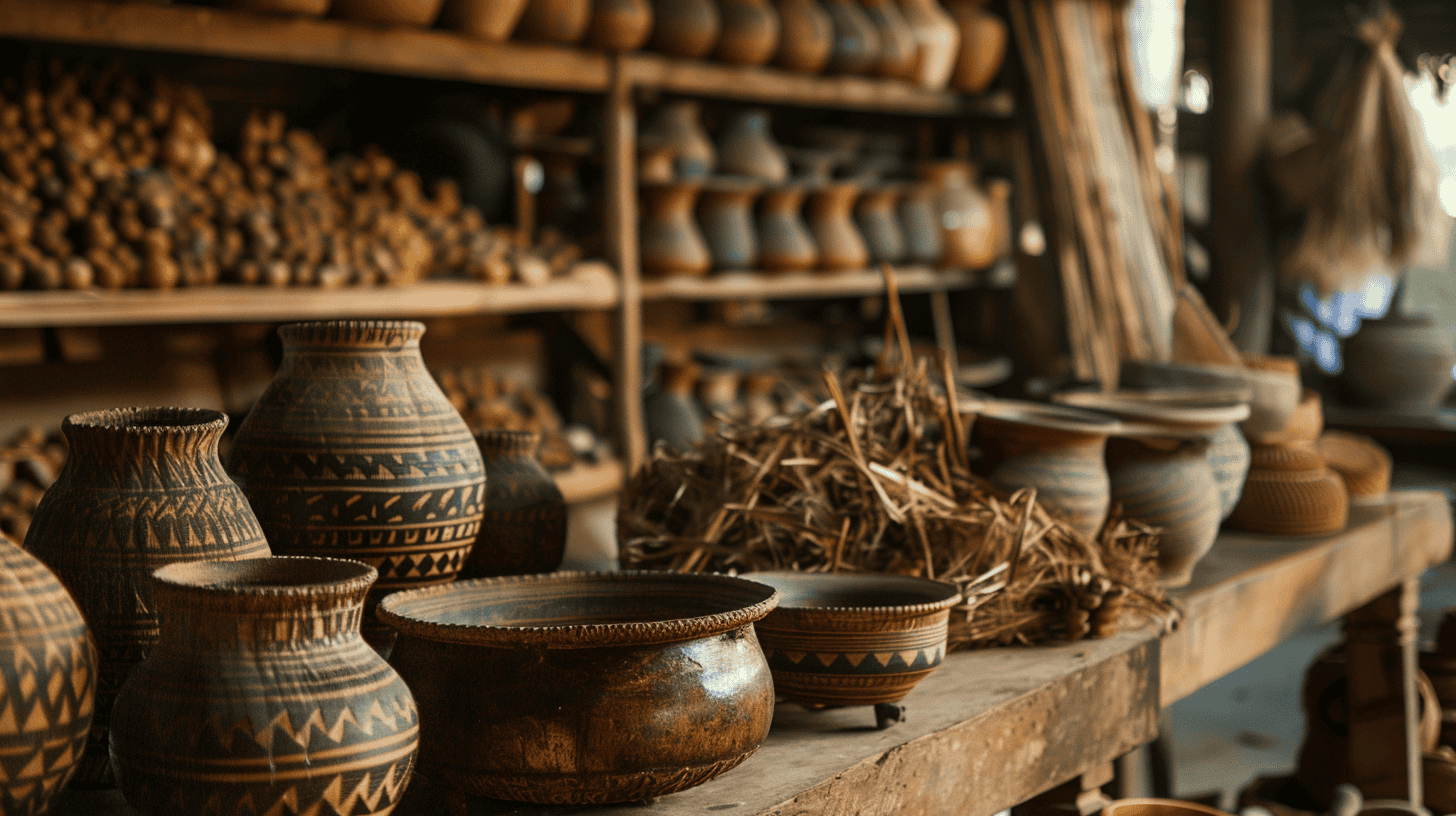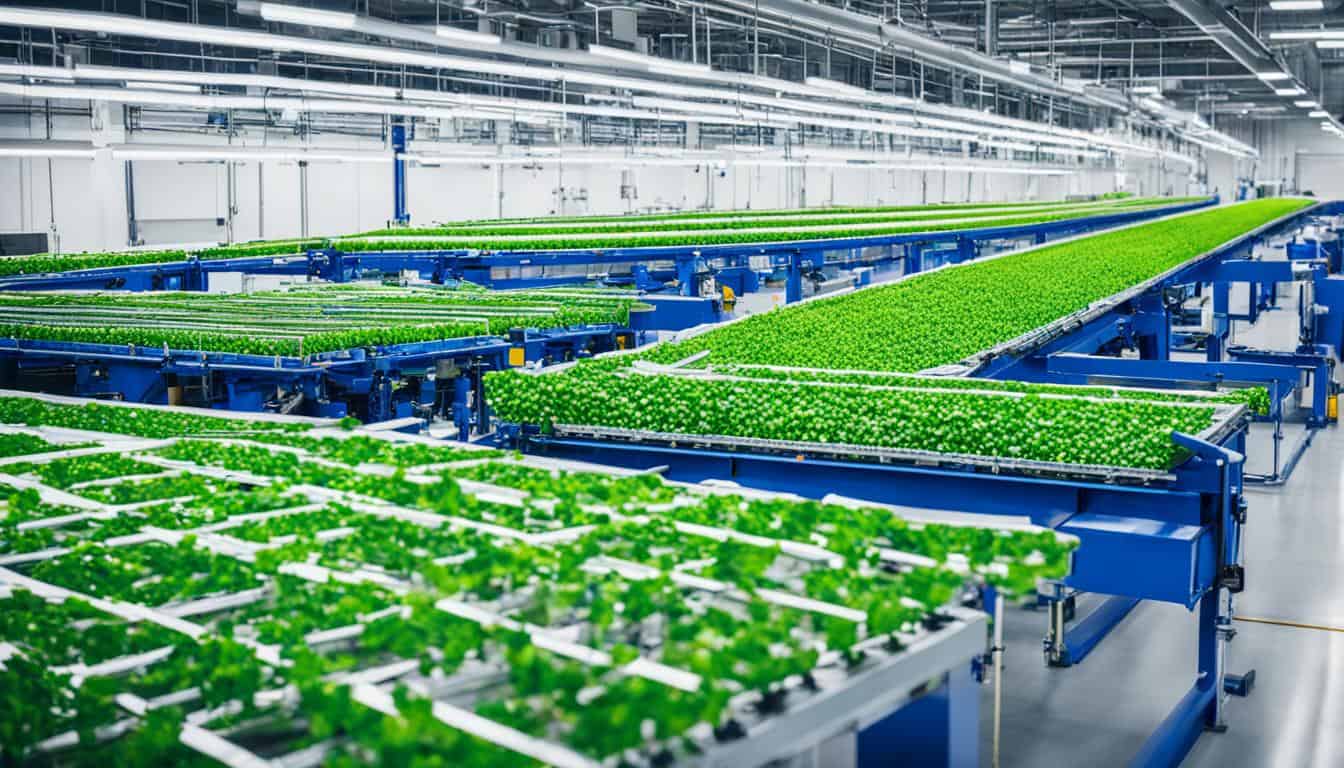Witnessing the fashion industry’s transformation towards sustainable and ethical practices is truly inspiring. This shift isn’t merely about adopting eco-friendly materials; it’s about an entire fashionable revolution that prizes transparency, quality, and social responsibility at its forefront. As a fervent supporter of sustainable fashion, I am drawn to the rich tapestry of artisanal goods thriving under this new reign — treasures crafted with traditional techniques, embodying the very cultural heritage that forms our shared human legacy.
This sustainability-led paradigm is rigorously committed to empowering local communities by supporting the very artisans who form the backbone of the fashion industry. These craftsmen, blessed with skills honed over generations, receive fair wages for their labor, creating a ripple effect that bolsters local economies and stokes the flames of responsible consumption worldwide.
Key Takeaways
- Sustainable fashion redefines the fashion industry, championing eco-friendly materials and ethical labor practices.
- Reusable and recyclable materials help reduce waste and environmental burden.
- Emphasis on artisanal goods helps preserve traditional crafting techniques and cultural heritage.
- Earning fair wages empowers the community of artisans, fostering a culture of well-being and sustainable prosperity.
- Support for local economies and responsible consumption go hand in hand, driving a positive change.
- Transparency and accountability are central to the ethics of sustainable fashion, promoting informed decision making.
- Investing in sustainable fashion articulates our social responsibility and commitment towards a greener future.
By embracing this sustainable fashion narrative, each one of us has a role in scripting a future where fashion and sustainability coexist, creating a world that is as stylish as it is conscientious.
The Impact of Fast Fashion on Environment and Communities
Modern fashion connoisseurs tend to imagine the realm of high fashion as a realm divorced from the harm of environmental degradation. However, the underbelly of fashion lies in the shadows of a model known as fast fashion—a realm more sinister than one might predict. As both an aficionado of style and a steward of the planet, I have found myself straddling the vast divide between the allure of fashion and its potential for harm. I understand that the sophistication we hold dear in fashion not only results from careful design but also conscientious production practices. It is crucial to shed light on the grave impact of fast fashion on our environment and communities to transition to a more sustainable and ethically sound fashion industry.
Challenges Posed by Mass Production and Overconsumption
The fast fashion model primarily revolves around mass production—creating vast quantities of trendy clothes heralded by fleeting trend cycles. Trapped in a constant cycle of producing, consuming, and discarding, fast fashion thrives on overconsumption, leading to a hoard of fashion articles manufactured quickly, worn briefly, and discarded rapidly. Merely economically tempting, this model masquerades stark underpinnings of egregious waste, exploitation of workers, and environmental degradation.
| Fast Fashion Industry’s Social Impact | Environmental Impact |
|---|---|
| Exploitation of workers in production factories | Exploitation of natural resources leading to ecological imbalances |
| Perpetuates a culture of overconsumption | Accelerates pollution, ozone depletion, and climate change |
| Encourages throwaway culture, leading to an increase in waste | Contributes heavily to landfill waste and ocean pollution |
The Shift Towards Sustainability and Ethical Practices
Despite the somber reality of the fast fashion industry, a beacon of hope shines brightly—the burgeoning commitment to sustainability and ethical labor practices. An encouraging turn towards responsible practices has begun to reshape the fashion industry. No longer catering only to the whims of transient trends, the industry now accords equal importance to both the planet’s ecological balance and the ethical treatment of its workforce. With the stakes higher than ever, the metamorphosis towards sustainable and ethical labor emerges not merely as a trend but as an essential framework—powerfully interweaving threads of innovation, integrity, and social responsibility in the fabric of the fashion industry.
The collective agenda is clear—an impetuous sprint towards fast fashion must metamorphose into a mindful stride towards sustainability. The efficiency and affordability offered by mass production must no longer supersede the necessity for community empowerment. With awareness growing about the environmental and social impact of our fashion choices, it is time to progress towards a path of sustainability and ethical mindfulness in our fashion practices.
Empowerment Through Ethical Labor Practices in the Fashion Industry

As the fashion industry moves towards a more sustainable future, my focus distills down to the heart of it all — the artisans. Behind every embroidery, every stitch, every weave, is a skilled artisan’s diligent hands. The best way that I see to support them, and by extension their communities, revolves around promoting ethical labor practices. Let’s delve deeper into what this means in tangible terms.
Supporting Fair Wages and Living Standards
Foremost is my commitment to ensuring fair wages. It’s about paying artisans not just for their labor, but respecting the richness of their craft. A fair wage empowers artisans to rise above the poverty line and help their families attain a comfortable living standard. This, in turn, promotes social responsibility by sculpting a stable economic base for local societies, showing how fashion can meaningfully fuel growth and prosperity at the grassroots level.
Ensuring Safe Working Conditions in the Fashion Industry
Enforcing safe working conditions forms an integral part of my approach. The idea is to ensure fashion’s glitter doesn’t dull the health and vitality of those who contribute tirelessly in its making. Offering safe working conditions isn’t a nod to legislation—it serves as a moral obligation to care for our artisans and preserve their well-being.
Advancing Gender Equality in Artisanal Communities
While degrading working conditions and low wages are a universal concern, they disproportionately affect women, who make up a vast majority of the global garment workforce. I believe in gender equality and see it as a crucial component of ethical labor practices. My goal is to provide equal opportunities for all, irrespective of gender, and give voice to the female artisans who’ve been obscured for far too long in the fashion industry.
| Key Aspects | Role in enhancing Ethical Labor Practices |
|---|---|
| Fair Wages | Prevents poverty, enhances living standards, lays a foundation for local economies |
| Safe Working Conditions | Protects health, ensures well-being, upholds human rights, improves productivity |
| Gender Equality | Nurtures diversity, powers social change, bolsters the economy, builds sustainable communities |
As we embrace these ethical labor practices, we set the stage for a transformation that far transcends the realms of fashion. It’s about uplifting communities, fostering equality, and breathing life into an industry that’s as much about people as it is about the products. Indeed, it’s the true essence of social responsibility, defined and refined.
The Renaissance of Artisanal Goods
As we veer towards an era where sustainable fashion reigns supreme, we also bear witness to the resurgence of artisanal goods. These treasures, brimming with creativity, authenticity, and cultural richness, seek to bridge the gap between the past and the present, breathing new life into time-honored techniques and inspiring modern fashion sensibilities.
Preserving Traditional Techniques and Cultural Heritage
Artisanal goods are not just the product of hands. They are born out of history and traditional techniques that have been carefully stewarded from one generation to the next. What differentiates them from mass-produced counterparts is the preservation of cultural heritage, the soul, and a sense of identity that they carry. Central to this renaissance is the commitment to eco-friendly materials in creating such goods, reducing the environmental footprint while ensuring the longevity of cultural artisans and their age-old techniques.
Encouraging the Craftsmanship of Local Artisans
Pledging support for local artisans does more than keeping centuries-old traditions alive. It is about nurturing talent, inspiring creativity, and honoring the unmatched craftsmanship that artisans pour into every piece. This not only paves the way for more sustainable fashion practices but also promotes economic solidity for communities where these artisans reside.
| Aspect | Contribution |
|---|---|
| Traditional Techniques | Preserves cultural heritage and skills cultivated over generations. |
| Local Artisans | Promotes local talents, boosts economy, and aids in sustainable fashion practices. |
| Eco-Friendly Materials | Reduced environmental impact and sustainability in fashion production. |
Supporting Local Economies with Sustainable Fashion
In a world increasingly captivated by sustainable fashion, the rippling effect of our choices weaves through local communities and economies. The move to ethically-conscious couture means embracing homegrown talent and resources through local sourcing, thereby bolstering small-scale businesses. This, in turn, contributes to the sustainable development of local economies and realizes a vision of an ethical fashion landscape focused on regional economic stability.
Benefits of Sourcing Locally for Sustainable Development
Sourcing locally has multifaceted advantages. It promotes efficient resource use, which is more attuned to the limitation of our planet and respectful of the pressing need for sustainability. Supporting local suppliers translates to thriving regional economies and homegrown industries. The result? A flourishing ecosystem intertwined with the threads of sustainable fashion.
Impact of Ethical Fashion on Regional Economic Stability
The step towards ethical fashion is more than a trend; it is a catalyst for positive change. By advocating for fair wages and ethical production, the fashion entity not only secures its position as a responsible brand but also plays an integral role in ensuring regional economic stability. The fashion industry’s move towards a just and equitable functioning model radiates beyond its confines, fostering a network of interconnected local economies on a ladder of progress.
Eco-Friendly Materials and Environmental Stewardship
As an advocate of sustainable fashion, my commitment is married to the imperative of environmental stewardship. There is an urgent need to shift from conventional, resource-intensive materials to eco-friendly alternatives like organic cotton or recycled fabrics. The transition to sustainably sourced materials is an essential part in curtailing pollution and waste. This ethos of sustainable practices pioneers a march against the deleterious impacts of traditional fashion sector trends and underscores the urgency of making environmentally conscious choices.

Reducing Resource Depletion through Sustainable Practices
In the battle against resource depletion, sustainable practices offer an effective remedy. By opting for materials that are less demanding on our precious natural resources, we minimize the environmental footfall of the fashion sector. Not only does it help in conserving our invaluable resources, but it also aids in mitigating some of the most pressing environmental challenges of our time.
The fashion industry can be a catalyst for significant change, leading the movement towards more sustainable business models that respect the Earth.
Tackling Pollution and Waste in the Fashion Sector
The ill effects of pollution and waste are painfully visible all across our planet. The fashion sector, owing to its massive scale and global reach, has a significant role to play in addressing these issues. By practicing waste reduction and recycling, we can stem the tide of environmental pollution and waste. This demands a collective effort to acknowledge and address the detrimental environmental effects associated with fashion production and consumption.
| Eco-friendly Materials | Benefits for Environmental Stewardship |
|---|---|
| Organic Cotton | Requires less water and no harmful pesticides, maintaining soil fertility. |
| Recycled Fabrics | Reduces landfill waste and curbs the demand for new resources. |
| Regenerated Fibres | Repurposes waste into new, usable materials, thereby minimizing waste. |
Advocating for Transparency in the Fashion Supply Chain
As an advocate for sustainable fashion, fostering transparency within the entire fashion supply chain is a fundamental aspect of my stance. This transparency allows consumers to trace their clothing back to its roots, lending visibility to its journey from raw materials to the finished product. This, in turn, helps build trust and accountability among fashion brands and their customers.
The Role of Certifications in Promoting Ethical Standards
Certifying bodies play a critical role in promoting ethical standards within the fashion industry. Certifications like the Fair Trade or the Global Organic Textile Standard (GOTS) function as a reliable seal of ethical assurance for consumers. These bodies assess and verify that manufacturers uphold ethical standards in their production processes, providing just treatment for workers and utilizing sustainable materials. In this way, they help fortify the trust and confidence of consumers in fashion industry practices.
How Consumers Can Foster Accountability in Fashion Brands
Yet, the responsibility doesn’t end with certifications. I believe in the profound power held by consumers, who exert a strong influence over fashion brands. Their commitment to ethicality can shape the industry, driving brands towards greater accountability. By making informed purchasing decisions grounded in conscientious consumerism, shoppers can help ensure fashion brands maintain ethical standards and adopt responsible practices.
One of the most effective ways for consumers to foster accountability in fashion brands is through their purchasing behavior. Consumers’ choices can signal a demand for greater transparency, pushing brands to be more open about their supply chains. Whether it’s opting for clothing made from sustainable materials, or supporting brands that treat their workers well, the purchasing decisions of consumers have strong power to influence industry practices. In this journey towards a responsible fashion industry, every purchase matters.
Ethical Consumerism and the Role of Shoppers

In the journey toward a more sustainable fashion industry, consumers have a crucial part to play. The choices we make, the brands we support, and the values we uphold in our shopping habits all shape the landscape of fashion.
Making Informed Choices for a Sustainable Wardrobe
With the rise of ethical consumerism, we now have the power and responsibility to shape our sartorial expression with consideration for both the environment and the people behind our clothes. Building a sustainable wardrobe is not about trends that fade with the changing seasons; instead, it’s about making informed choices. Investing in high-quality items that last, choosing brands that prioritize fair labor practices and environmental preservation, these are choices that make our wardrobes more sustainable.
Embracing Slow Fashion for Long-Term Change
Slow fashion offers a viable and ethical alternative to the wasteful and exploitative practices of the fast fashion industry. Prioritizing conscious consumption and durable fashion, slow fashion is characterized by timeless, versatile pieces made from environmentally-friendly materials, produced under fair labor conditions. It’s a movement that champions style with substance, contributing to long-term change in our personal wardrobes and the fashion industry at large.
Investing in Quality over Quantity
In my mission to support sustainability, one of my cardinal principles is an emphasis on quality over quantity. The paradigm of investing in high-quality, durable pieces circumvents the quick turnover and wasteful practices encouraged by fast fashion.
By opting for well-crafted, long-lasting pieces that are as enduring in style as they are in substance, I participate in lightening the environmental burden. It’s not just about feeling good in what I wear, it also about feeling good about where it comes from and how it impacts our planet.
I advocate for brands that are eco-conscious, that creates sustainable products reflecting an ethos of responsibility. I firmly believe that the power of transformation lies not only in the hands of the creators but also in the choices of consumers like us. By supporting these ethical fashion houses, I contribute to the demand for responsible fashion choices, thereby invoking a realization within the industry of the desirability and feasibility of sustainable practices.
Gradually, as more consumers gravitate towards sustainable products, an irrefutable message takes shape. Responsibility in fashion choices represents an enduring pledge. It symbolizes our shared commitment to safeguarding our home – our environment, and fostering a future where fashion harmonizes with sustainability.
FAQ on Artisanal Goods and Ethical Labor
Q: What is the importance of promoting sustainable artisanal goods within the fashion industry?
A: Promoting sustainable artisanal goods holds a crucial place within the fashion industry as it aids in supporting the balance between economic progress, environmental impact, and social responsibilities. By leaning towards such ethical and sustainable practices, brands not only support artisan craftsmanship in local communities but can also reduce their impact on the environment.
Q: How can sustainable fashion brands support artisan craftsmanship?
A: Sustainable fashion brands can support artisan craftsmanship by implementing ethical production practices, thus ensuring that artisans receive fair compensation for their work. This includes partnering with artisan communities around the world, providing them with stable income and fostering their skills while maintaining a focus on sustainable production practices.
Q: Why is an ethical handcraft program important?
A: An ethical handcraft program ensures that the artisans are not vulnerable to exploitation. With ethical values at the forefront, these programs are designed to support and foster the unique skills of artisans in local communities, while also encouraging the use of sustainable production methods that have minimal environmental impact.
Q: How do home and small workshops fit into the sustainable fashion movement?
A: Home and small workshops are crucial in the sustainable fashion movement as they often employ local artisans, thereby enriching communities and preserving handcraft traditions. By supporting these workshops, brands can ensure ethical practices throughout their production line, pay fair wages, and reduce the environmental impact.
Q: How does the support of sustainable artisanal goods affect local communities?
A: The support of sustainable artisanal goods has a profound impact on local communities. It provides stable income for artisans, helps maintain traditional handcraft skills, and encourages ethical labor and sustainable production practices, presenting a viable livelihood option for many.
Q: What is the environmental impact of promoting sustainable artisanal goods?
A: Promoting sustainable artisanal goods helps in mitigating the fashion industry’s impact on the environment. Adopting sustainable production practices reduces waste and resource consumption, while encouraging the use of natural, recyclable, and biodegradable materials contributes significantly to the reduction of environmental impact.
Q: Why should consumers choose sustainable fashion brands?
A: Choosing sustainable fashion brands enables consumers to contribute to an ethical and responsible fashion movement. These brands prioritize ethical values, fair wages for artisans, and sustainable production practices, therefore patronizing them also means supporting artisans around the world and contributing to the reduction of environmental harm.
Q: How can ethical handcraft program support artisans vulnerable to exploitation?
A: An ethical handcraft program provides artisans with fair wages and safe working conditions, decreasing their vulnerability to exploitation. Such programs also often include initiatives aimed at enhancing the artisans’ skills, thereby empowering them to progress within their craft and ensuring a sustainable income.
Q: What are the ethical values promoted among artisans in the sustainable fashion industry?
A: The sustainable fashion industry promotes values such as fair wages, safe and healthy working conditions, transparent supply chains, and respect for the environment. It also encourages artisans to continue harnessing and developing their traditional skills in handcraft, with emphasis on sustainability at every step.
Q: In what way does promoting sustainable artisanal goods contribute to the wider fashion movement?
A: By promoting sustainable artisanal goods, the fashion industry can make a significant stride towards broader ethical and sustainable practices. It not only supports local communities and protects artisan craftsmanship, but also influences other fashion brands to adopt sustainable production practices, fostering a wider culture of sustainability in the industry.





Leave a Reply